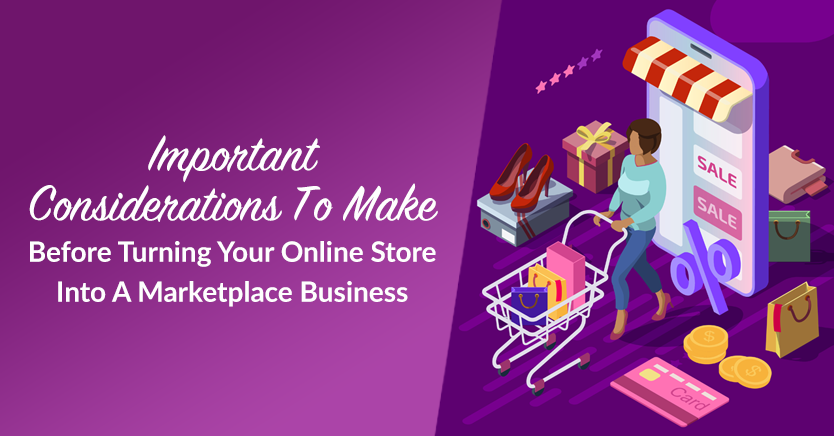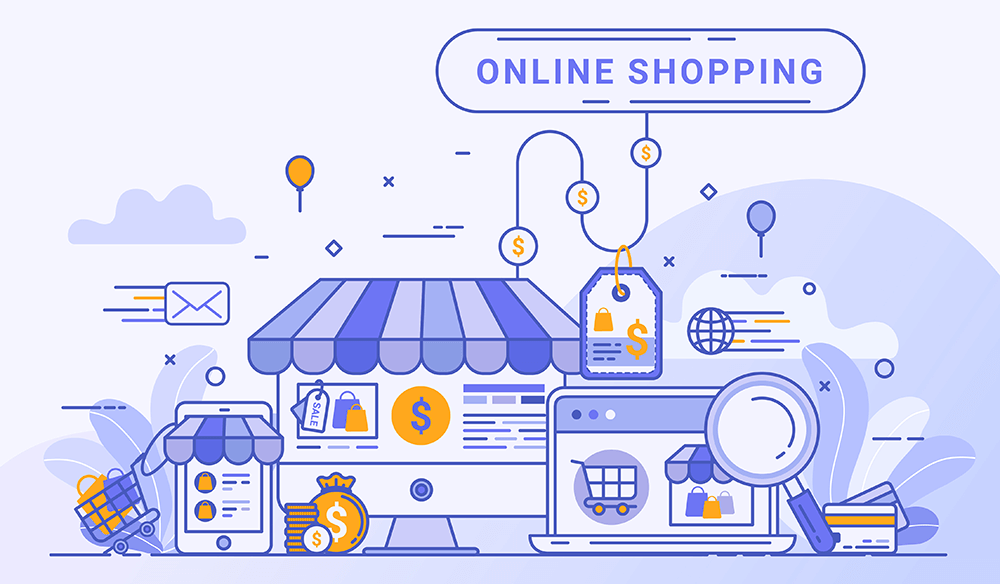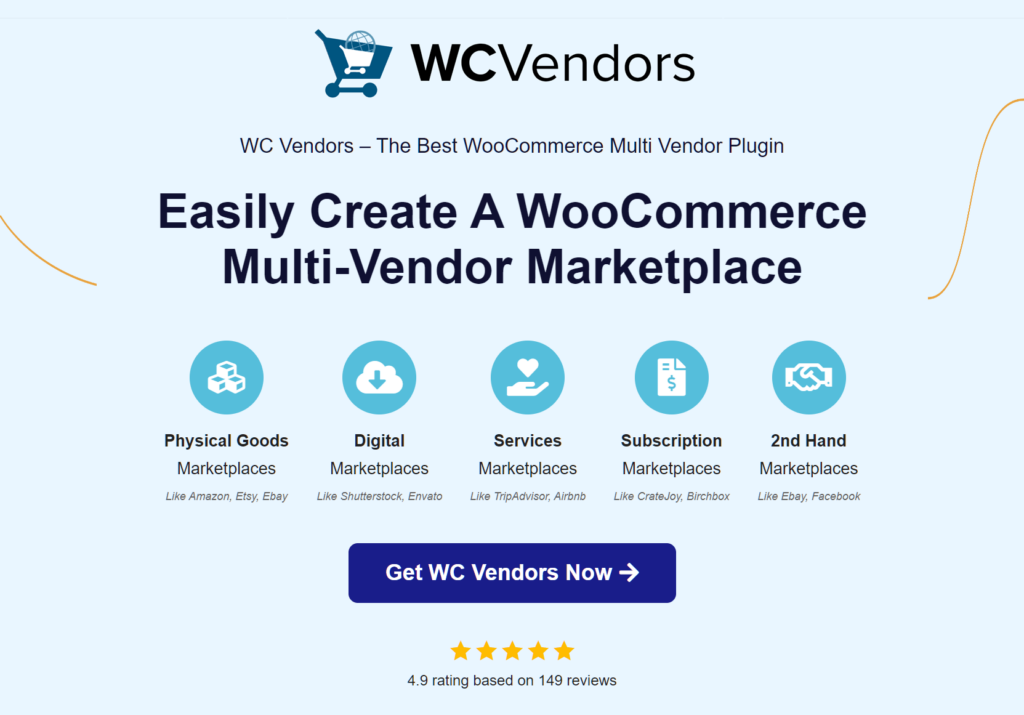
Online marketplaces have made a big splash in the e-commerce world, causing some individual sellers to consider converting their online stores to multi-vendor platforms. There are a variety of great reasons to do this including some serious potential for revenue growth. However, launching a marketplace business isn’t necessarily that simple.
For starters, not all marketplaces are a huge success. Many of them flop without ever really getting off the ground, and if your company doesn’t think through the implications of starting one, you risk following in their footsteps.
Another concern is that not all sellers need to become marketplaces. There’s that old adage: “If it ain’t broke don’t fix it.” Some successful sellers should just keep doing what they’re already doing.
It’s not all doom and gloom, of course. There’s always the potential for success, especially if you know that starting a marketplace business is the right move.
We want to help you evaluate where you’re at so that you can make an informed decision about starting a multi-vendor platform. For this reason, today’s article will explore the key factors you should consider before turning your online store into a marketplace.
Launching A Marketplace Business: The Potential Perks Are Real
Every businessperson is looking for ways to generate more revenue, and many online store owners see transforming their online store into a marketplace as a way to do that.
Think about it: You get all the same benefits of managing an online store while also bringing other retailers in. You succeed when they succeed, so even if your store’s sales drop a bit, you can still grow your overall revenue. Depending on how you set up your relationship with these third-party sellers, you might receive commissions, advertising costs, or membership fees.
In addition, you have the potential to be exposed to a wider audience. After all, each vendor brings their customers to the marketplace. Moreover, if you recruit vendors whose products are similar to yours, their customers will likely be interested in what you’re offering, as well.
If you’re looking for new ways to generate revenue while expanding your audience, going the multi-vendor route might be a great option. However, understand that it’s not a guarantee to greatness; there are challenges along the way that you should be aware of if you want to succeed.

Success Won’t Come Without Challenges
Success as an online marketplace doesn’t come overnight. You can’t just flip a switch and expect your multi-vendor site to suddenly kick into high gear. Just like running an online store, marketplaces require diligence while overcoming challenges.
Here are three of the biggest challenges many people encounter.
1. Going from one business model to another
By far the biggest challenge new marketplace business owners face is underestimating what they’re getting into. Adding third-party vendors isn’t like adding an app that will run itself. It is, in fact, a fundamental change in your business model.
Retailers considering the move to multi-vendor should prepare for some pretty radical transformations, including:
- Having a new business plan in place
- Understanding market expectations
- Knowing legal requirements
- Managing vendor payouts
- Utilizing the right tech to accommodate more functions
This list is hardly exhaustive, but it should provide a simple overview of how different it is to manage a marketplace business compared to an online store. If you’re looking for more, we’ve talked about some of the other things people often overlook when starting a multi-vendor marketplace in another post earlier.
2. Having to still sell your products, as well
Another challenge to consider is that you’ll still have to run your online store while also managing your marketplace business. It’s not like the store will magically start to take care of itself once you bring in other vendors. It will require just as much attention as it did before.
This doesn’t necessarily mean you’re going to spend every waking moment on either business. However, it’s important to calculate the cost before you jump too far in. By adding a marketplace, you’re essentially taking on an additional business, not just an added feature for your store. Operating both can be overwhelming at times, though the grind can be worth it once sales start coming in.
3. Acquiring vendors
As an online store owner and operator, you already know the challenge of growing a customer base. You have to identify your target audience, market to their needs, and keep them interested in your brand. None of that goes away with a marketplace business since you still need customers. However, there’s an additional layer: acquiring vendors.
Vendors want to partner with marketplaces that they feel will help them sell their products. It’s a mutually beneficial relationship between the two parties. More vendors help the marketplace business succeed, and joining a successful multi-seller platform helps vendors succeed.
The issue is that there’s a bit of a chicken and egg problem. Which one comes first, vendors or marketplace success? The answer is not so simple since both will need to happen at the same time.
For startup marketplaces, this can be frustrating. You’ll need to recruit vendors, but they’ll want to know that there’s something in it for them. As your platform becomes more established, this gets easier, but in those early days, you might have to woo some sellers onto your platform.

4 Questions To Ask When Evaluating Your Online Store’s Readiness
It can feel intimidating to see all that goes into building an online marketplace business, but there are real, enormous benefits, too. We don’t want to scare anyone away from these potential advantages. We simply want to help you make the most informed decision possible.
One good way to assess your readiness is by knowing where your online store stands today. Here are a few questions to ask yourself to help with your consideration.
1. Have you built a community?
Marketplaces thrive off tight-knit customer communities. It’s highly unlikely that any marketplace competes with global platforms like Amazon, eBay, or Walmart. Thus, to stay competitive, most successful marketplaces find a niche product that attracts a smaller group of dedicated customers. Then, they build a community around that product.
Online stores with established communities will have a better chance of transitioning into a marketplace because they’ll have a base to work from. The more you develop that community, the easier it will be to transfer over and build upon in your marketplace business.
2. Are you capable of taking on additional responsibilities?
Burnout is real, and running an online store can take a toll on anyone. Assuming the additional responsibilities of operating a marketplace will mean more work and more management.
Make sure that you can reasonably address the needs of your marketplace business before you jump into it. Let yourself dream a little: what happens if it’s successful? Can you handle the extra duties that come with that?
Keep in mind that you can also expand your team and hire help. It doesn’t all have to fall onto your shoulders, but in the early days, you must be ready to wear multiple hats. If that doesn’t scare you too much, then you might be ready to move forward.

3. Are there vendors you can reach out to?
Finding vendors to join your marketplace can be more of a struggle than you might think. You don’t want to just bring in random sellers. They need to fit the overall niche and brand of the marketplace as a whole.
Having an existing network to pull from, or at least having some ideas and contacts, can make it much easier to get started. Think about any vendors you know of that would fit or do some research ahead of time before fully jumping into a marketplace.
4. Do you have the infrastructure in place?
Adding vendors to your online store often means additional tech specs on your site. Customers want speedy loading times, smooth checkouts, and seamless experiences. When they don’t find those in a marketplace, they look elsewhere, and you lose customers.
To avoid this ahead of time, make sure you have all the necessary technical pieces in place to get the most out of your marketplace business. Everything should be optimized for mobile shopping, too, since that continues to rise.

Get The Right Tools In Place
Imagine someone trying to run a shopping mall (remember those?) without any software to collect rent or list available space. It’d be utter chaos. You’ll need the right tools in place, and the same thing is true for online marketplaces.
You’ll need software that helps you manage your products, vendors, and customers. You’ll want to monitor the success of your various vendors, giving you insight into how they can better succeed so you can help them grow and keep them around.
WC Vendors was created to help users seamlessly create full-fledged multi-vendor marketplaces. Our easy-to-use platform enables you to get set up in minutes, and we’d love to help you make the transition and experience the benefits of a successful online marketplace business. Check out a free demo of our product and see what it’s like to be behind the driver’s seat!
Conclusion
Before transforming your online store into a multi-vendor platform, it’s crucial to familiarize yourself with the challenges associated with launching a marketplace business. This way, you can prepare yourself ahead of time to ensure success when surmounting such challenges.
To recap, the challenges you can expect when starting a marketplace business include:
- Going from one business model to another
- Having to still sell your products, as well
- Acquiring vendors
To determine whether or not you’re ready to transition into a marketplace business, ask yourself the following questions:
- Have you built a community?
- Are you capable of taking on additional responsibilities?
- Are there vendors you can reach out to?
- Do you have the infrastructure in place?
Do you have any questions about launching a marketplace business? Let us know in the comments so that we can help you out!
